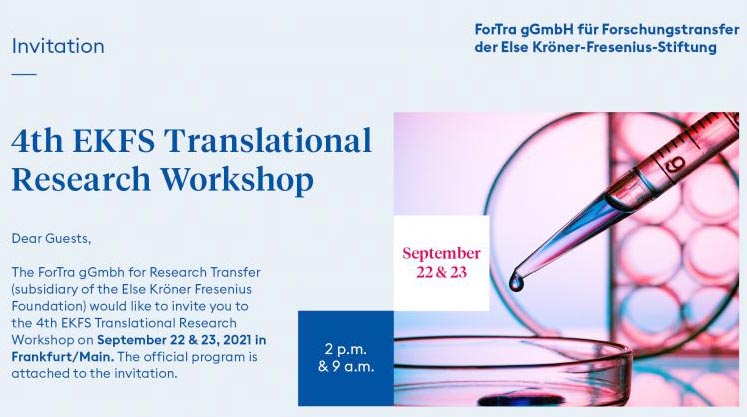Translational Research Workshop: How to Improve Translational Medicine

© EKFS
The ForTra gGmbh for Research Transfer (subsidiary of the Else Kröner Fresenius Foundation) would like to invite to the 4th EKFS Translational Research Workshop on September 22 & 23, 2021 in Frankfurt/Main.
At the workshop distinguished experts will discuss the important challenge “How to Improve Translational Medicine”. They will present possible solutions to increase the chances of biomedical products reaching the market and benefiting patients.
Come and join us in Frankfurt to discuss the possibilities for empowering translational medicine and learn about a variety of tools to support and finance your translational research project on its way to clinical application.
Attending the workshop is free of charge, but you need to register in advance at the following email address: translatorik@ekfs.de
The limited seating will be allocated according to the time of registration (first come, first served).
What: How to Improve Translational Medicine
Date: September 22, 2 p.m. & September 23, 9 a.m.
Target audience: for physicians and scientists interested in the successful implementation of their projects on its way to clinical application. The lectures and discussions will be held in English.
Where: Congress Center Messe Frankfurt am Main, Entrance: Ludwig-Erhard-Anlage 1, 60327 Frankfurt am Main, Germany
Wissenschaftliche Ansprechpartner:
Queries: Prof. Dr. Martin Zörnig, +49 (6172)-8975 12
Registration: translatorik@ekfs.de
Weitere Informationen:
https://ekfs.de/en/current-topics/events/4th-translational-research-workshop-how…
Media Contact
All latest news from the category: Seminars Workshops
Newest articles
Faster, more energy-efficient way to manufacture an industrially important chemical
Zirconium combined with silicon nitride enhances the conversion of propane — present in natural gas — needed to create in-demand plastic, polypropylene. Polypropylene is a common type of plastic found…

Energy planning in Ghana as a role model for the world
Improving the resilience of energy systems in the Global South. What criteria should we use to better plan for resilient energy systems? How do socio-economic, technical and climate change related…

Artificial blood vessels could improve heart bypass outcomes
Artificial blood vessels could improve heart bypass outcomes. 3D-printed blood vessels, which closely mimic the properties of human veins, could transform the treatment of cardiovascular diseases. Strong, flexible, gel-like tubes…





















